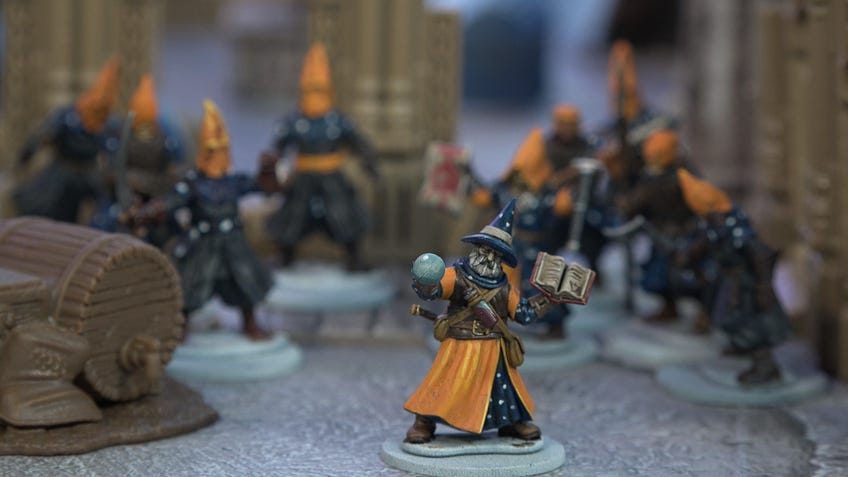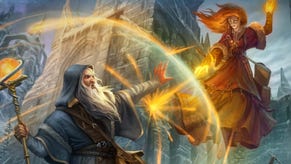Better fights than D&D, greater stories than Warhammer: Frostgrave is the miniatures game everyone should play
Spell it out.
Can we all just take a moment to appreciate wizards? Pondering their orbs, concocting great spells, sending countless mercenaries to their deaths because they want some new reading material. What’s not to love about these wonderful megalomaniacs? Oftentimes I lie awake at night dreaming of becoming a wizened old bastard man with magical powers.
There’s nothing that fulfils that fantasy better than the tabletop miniatures game Frostgrave, by Joseph A. McCullough. Imagine a world where Dungeons & Dragons’ combat is actually fun, where the wizard is not just the most powerful member of the party but the designer actually intended them to be - and it’s not just your friend Steve powergaming to high hell and solving every problem in the dungeon with one of his four billion spells.
If you love narrative-driven, competitive campaigns with emergent storytelling, incredibly accessible rules and materials - and, most importantly, the ability to pick up pebbles and turn them into magical frag grenades - Frostgrave might just be the game you’ve been waiting for.
Long ago, the great city of Felstad sat at the centre of a magic empire. Its towering spires, labyrinthine catacombs and immense libraries were the wonder of the age, and potions, scrolls and mystical items of all descriptions poured forth from its workshops. Then, one cataclysmic night some really bad stuff happened and the place got really messed up with a deadly, impassable blizzard.
I may have paraphrased slightly there, but the point is: the age of Felstad’s dominance is gone, and all those incredible, magical trinkets are still right there. The city has become a huge icy burial ground covered head to toe in magical monsters, crumbling ruins and a butt-load of treasure, and it’s finally starting to thaw. A new name seems appropriate: Frostgrave.
With more curiosity than sense, you and as many friends as you like take the role of powerful but low-level wizards who are seeking a bit of mystical enrichment among the city’s bones. With some starting cash you’ll assemble a warband of marauders and misfits who are willing to put their lives on the line in your service in exchange for a pretty penny. Perhaps you’ll even hire an apprentice to learn from your great mind and serve as an understudy in the battles to come.
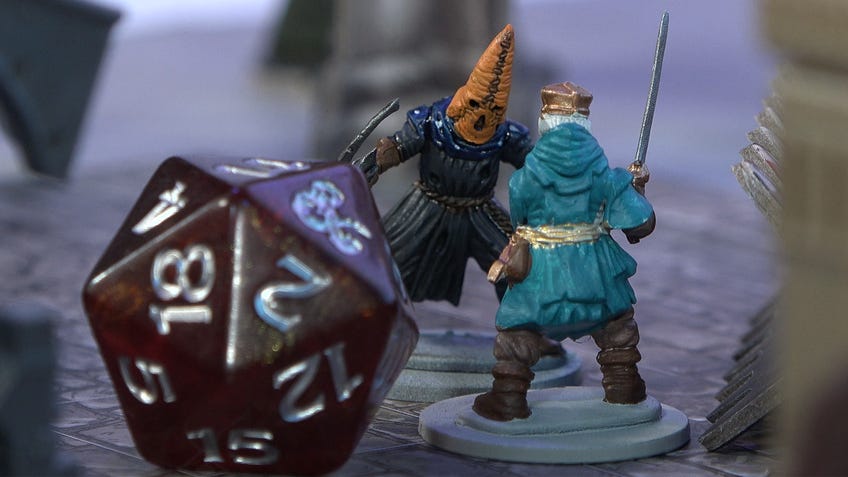
When it comes to the wizards themselves, that’s where you get the most customisation of all. At the heart of Frostgrave’s slimline ruleset is the wizard’s toolbox, a plethora of deadly and dastardly spells from ten different schools of magic. Chronomancers can bend the very passage of time, Enchanters will imbue their and their warrior’s weapons with arcane power, Summoners will, well, summon things. While most of the spells in your arsenal will come from the school of magic you choose to study, you’ll also be able to pick spells from all sorts of other schools for a wide and varied arsenal.
Compared to Warhammer, it’s refreshingly streamlined.
Everything in Frostgrave works on a d20 die roll, and - for the most part - you’ll only ever have to roll once to get your result. It’s a far cry from the sea of d6 rolled in a game of Warhammer. Melee combat is as simple as the attacker and defender rolling a d20 each and adding their respective fight abilities to their result. Once you’ve got that number it acts as your ability score and your damage all in a single throw. It’s refreshingly streamlined. It also means that rolls that just scrape over your result aren’t going to decimate you if their number is pretty meagre. You’ve got to roll well to hit well.
Casting your spells is as simple as rolling the target number or higher listed by their name, but spells are dangerous things. Fail your cast and you might take one or two points of damage in the process. If a spell is absolutely crucial you can choose to damage the caster voluntarily to increase the value of your roll by one for every point of health you sacrifice. Perfect for ensuring those clutch casts come to fruition.
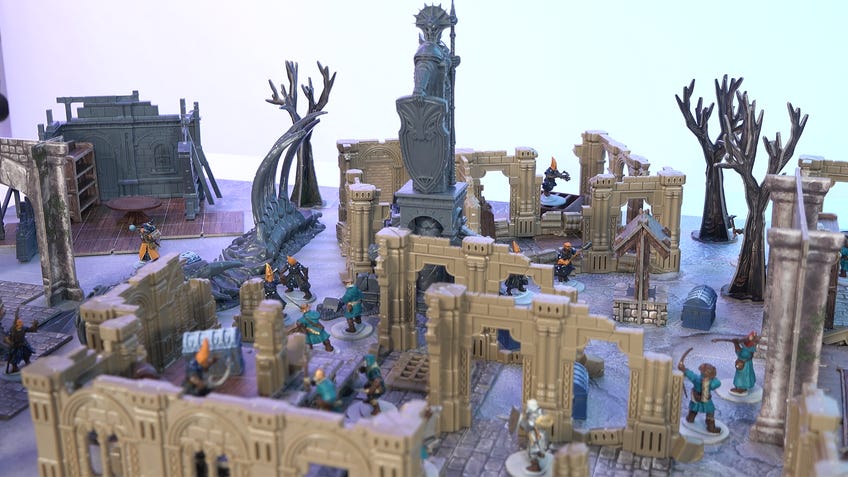
Casting spells outside of your own school of magic is not just possible, but encouraged. Frostgrave is a game of customisation and the whole arsenal of spells is at your disposal. But the more foreign the magic is to your wizard, the higher the target number will be pushed. Some schools of magic are aligned, making them slightly more trivial, but most are more neutral and will suffer a penalty, with a school completely opposed to yours being the trickiest to cast.
This is one of the best things about Frostgrave: it’s never a game that outright says no. If you want to invest all of your level-ups into learning spells from an opposed school of magic and gradually whittle down the casting values until they become feasible, you can absolutely do that. This is where long-time, dedicated players of games like Warhammer will really revel in Frostgrave’s design - both in the freedom the game affords you, and the respect with which it treats you.
Games Workshop has often felt like a miniatures studio first and a game design studio second. It makes its money when you spend your life’s savings on a massive, intricate model of some four-headed dragon that takes multiple weeks of your life to build and paint. While those models are absolutely beautiful things - real works of art that you can be proud of constructing and will look great on both the table and your shelves at home - if the game itself doesn’t give you your just reward for the time and money invested in this special character or unit, you’re not going to be happy. You might not want to buy something that expensive and intricate again. That’s why the number of special rules and equipment and named characters and modifications that exist in Warhammer games is so overwhelmingly large. Everything has to be special and you can often only play with it if you’ve paid your way in.
Frostgrave, like many other indie miniatures games, takes the opposite approach. As specifically stated in the rulebook, you can play with literally anything you have on hand: board game pieces, whatever’s lying on your table, Lego figures, wooden blocks, cardboard cutouts, even Warhammer miniatures. It doesn’t matter. The game is built out of repurposable building blocks that you, the player, weave together to make the magic happen.
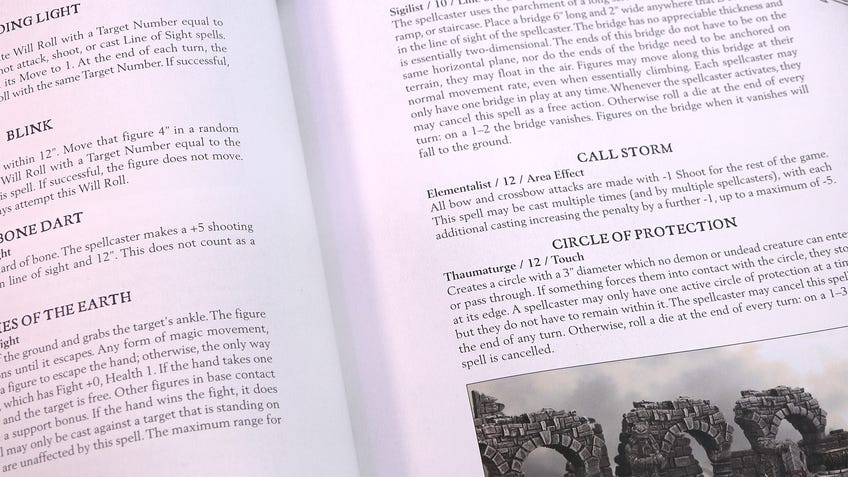
There are official Frostgrave models produced by North Star, and they’re lovely. There’s loads of variety, they’re nice and cheap, and you can probably build two complete starter warbands from just two boxes of figures. But if you don’t like them or can’t afford them, don’t even worry about it. You can turn up with anything you want - as long as they’re roughly the same size as your opponent’s figures and you know what represents what, it’s all gravy.
Frostgrave is as much of a roleplaying game as it is a miniatures combat game.
You’re not spoonfed giant tomes of unparseable lore and a list of main characters as long as your arm, either. Your characters are those main characters. There’s a reason I brought up D&D earlier; Frostgrave is as much of a roleplaying game as it is a miniatures combat game. The game doesn’t just support narrative campaigns - it’s built around them.
There’s a strong emphasis on the things your character can do outside of the battles you’ll be fighting. You gradually level-up your wizard and their party, find new trinkets and legendary items that you can equip or sell on the markets. You can use that money to invest back into your warband or to build a home base with modular upgrades that earn you random rewards, increase your warrior count or improve your ability to cast certain spells. You can theoretically learn more spells that are cast before a match even begins than ones that aid you in battle if you so wish.
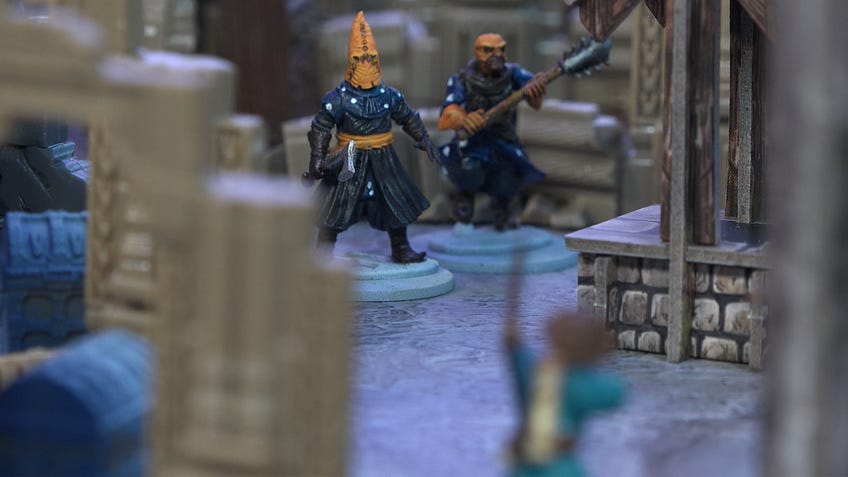
Wizards already start as interesting and complex units, with their apprentices essentially acting as slightly weaker duplicates, but as you play more and more games with your friends they evolve into really complex and interesting characters. They learn new spells and develop strategies, before having those strategies found out and countered by their opponents. They can build a unique warband with their own quirks and qualities, establish a base of operations that’s full of character and interesting boons, and have an entire TV series’ worth of fantastical tales and exploits they’ve performed or witnessed.
It’s everything Warhammer’s narrative campaigns promise, but I’ve never personally felt they’ve delivered. All that, in a cheap book that doesn’t require hundreds of pounds worth of plastic and paint as an entry fee.
There are plenty of fun interactions to be had on the table even if you don’t end up playing a lengthy campaign, too. First of all, Frostgrave is a skirmish game. Warbands have a maximum of 10 figures: a wizard, an apprentice and eight soldiers of your choice. Only four of those soldiers are allowed to be one of the more powerful specialist roles, but even those can be just as susceptible to a swift stab to the gut as the most cheap and basic unit.
This is because Frostgrave has a pretty brutal combat system. Even if warriors are equipped with the strongest armour and expertly trained, one bad roll can see them taken out in a single hit. This makes for some really fast and frenetic skirmishes, with entire dynamics changing as the result of one crucial die roll. It also means that getting into pointless fights can really screw you over, inviting a more tactical approach rather than just slamming your models together and hoping for the best. It’s all to serve the true reason your wizard has delved into this fight in the first place.
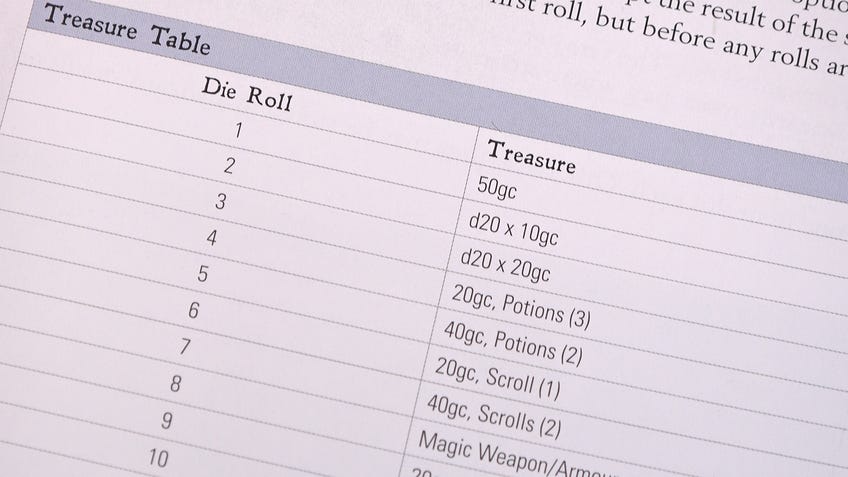
In Frostgrave the true prize isn’t some arbitrary victory points for taking out your enemy’s prized dragon. In fact, you don’t get anything for killing enemy units - even rival wizards. Outside of scenario specific objectives, all of your experience and rewards come from casting spells and grabbing the most precious resource in the game: treasure.
After setting up a dense and complicated board of terrain befitting the ruinous maze of Frostgrave, you and your opponent will sprinkle your beautiful board with some precious treasures. What these treasures actually are will be determined after the game is done, but suffice to say they are absolutely worth the effort. Each player places two treasures each, with one more placed slapbang in the middle of the board - meaning there’s always one more just within reach that you’ll definitely have to fight over.
This isn’t a game for pacifists - you absolutely will be fighting. It’s just that your primary goal will be dragging those heavy treasure chests off the board rather than painting the snow red with your enemy’s viscera.
One of the things I love most about Frostgrave’s singular focus is that you can always prepare for the next random event you’ll be encountering because the primary objective always remains the same. The scenarios in the book add some side objectives you can complete to grab some experience, as well as some interesting obstacles that halt your process towards those chests. Giant worm attacks, magical statues that zap you with random spells, unending skeletal hordes - there’s a lot of danger awaiting you in the frozen city.
One of the best parts of playing Frostgrave is after the game is already finished and you get to roll on the treasure tables to see which magical weapons and trinkets you’ve unearthed, how much gold you’ll be able to fill your coffers with, or the new spells you’ll be able to learn.
All this stuff is included right in the main book: 20 different scenarios, all the base upgrades and magical items you could ever want, optional rules like randomly-spawning monsters and critical hits. It’s an absolute plethora of content packed into such a lightweight book and there’s plenty of expandable content to supplement it, including fully fleshed-out linear campaigns for long-term players. Not to mention there’s an entire sister game set in a sci-fi, spacefaring future with aliens, spaceships and everything else you might expect from the genre by the name of Stargrave.
If you’ve got some miniatures and terrain lying around, or don’t mind constructing some stuff out of paper, I absolutely urge you to grab Frostgrave’s book or rules PDF and get playing.
